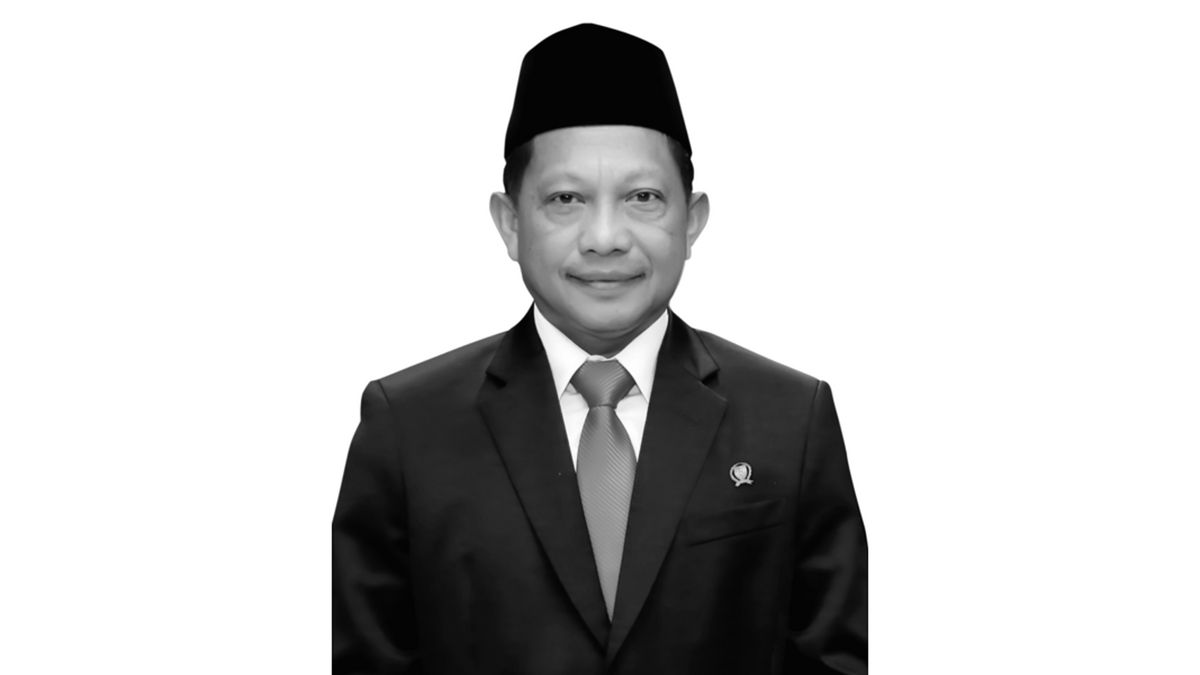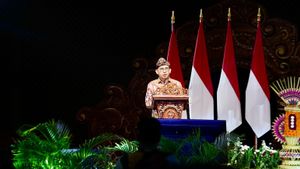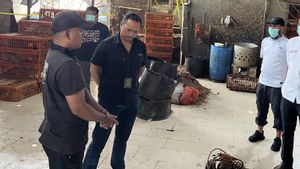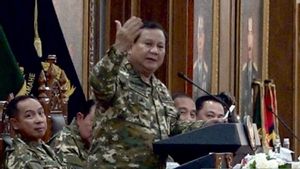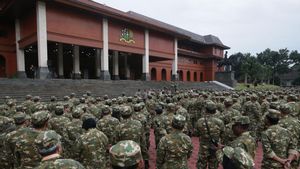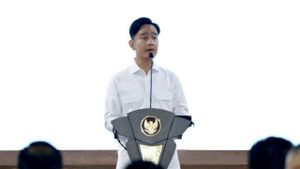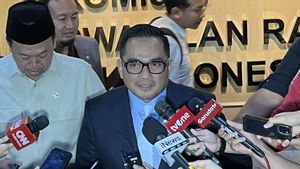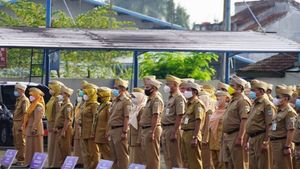JAKARTA - General Police (Ret.) Prof. Drs. H. Muhammad Tito Karnavian, MA, Ph.D. is the 23rd National Police Chief appointed by Jokowi as Minister of Home Affairs for the Advanced Indonesian Cabinet for the period 2019-2024. The figure of a retired four-star general who became the first person to be recorded in history for the first time came from the Bhayangkara Police Corps. His job as successor to Tjahjo Kumolo was directly mandated by the president to synchronize with local government and e-KTP population data.
"Once again, the Ministry of Home Affairs is adjusting the policy between the central government and the regions with the main spirit is to facilitate the investment climate. We will specifically discuss it later," said Tito.
"Synergy with local governments, regarding the population data of e-KTP is under his authority. Including legal certainty in the regions, especially those related to investment,"
The Ministry of Home Affairs is one of the ministries that can never be dissolved directly by the elected president of the Republic of Indonesia according to the rules of the 1945 Constitution.
Completing Tito Karnavian's quite tough task, if there are three basic problems that must be resolved as soon as possible, as he is able to solve the terrorist kingpins in the land, namely:
First, Tito must be able to reduce turmoil in various regions, especially Papua. So that the socio-economic stability in the area is maintained and conducive. In this way, regional development and development can be accelerated. To minimize the index of corruption figures that have occurred so far for regional heads in intense collaboration with the Corruption Eradication Commission (KPK). Devise strategies for how the democratic process of regional head ownerships is no longer high cost, but rather efficient, effective and cheap. So that it does not make regional heads trapped in corruption to return capital. Who is Tito KarnavianMuhammad Tito Karnavian was born on 26 October 1964 in Palembang, South Sumatra. As the first of four children, the couple H. Achmad Saleh and Hj. Cardiah. Tito's extended family lives with a mediocre economic background. Since childhood, Tito has grown up and grew up in his hometown. He attended Xaverius 4 Palembang Elementary School, then at Xaverius 2 Palembang Junior High School, and chose a public school while in SMA with SMA 2 Palembang. But in grade 3, he began to take the pioneering exam, which is currently known as SMPTN. Tito's parents actually expected their child to become a doctor later, but the choice was different through the Police Academy route. Since young, Tito has proven how his brilliance is able to answer the four test results he passed with the predicate of passing. Starting from tests at the medical faculty at Sriwijaya University, the faculty of International Relations at Gadjah Mada University, then the State College of Accountancy, and the Indonesian Armed Forces Academy. The last name of the four was chosen by Tito through the AKABRI Police route.
He graduated in 1987 with the title of the best Academy of Sciences graduate and was entitled to receive the Adhi Makayasa star. Tito married Tri Suswati in 1991 and has three children who are now living in another country, Singapore.
Tito Karnavian's academic achievements are engraved through his various titles, including; Master of Arts in Police Studies from University of Exeter, UK. Then, Bachelof of Arts in Strategic Studies, Massey University, New Zealand.
His expertise in the world of terrorism is engraved with a Ph.D. in Strategic Studies with interest on Terrorism and Islamist Radicalization from S. Rajaratnam School of International Studies, Nanyang Technological University, Singapore.
Tito Karnavian's careerWith the addition of the title of professor from the Police Science College (PTIK), Tito Karnavian is automatically listed as a professor at the institution.
This four-star general reached the peak of his career as the number one person in the Indonesian Police on July 13, 2016. He was appointed to replace General Badrodin Haiti, who had entered retirement. Having not finished his term of office, he resigned in mid-2019 and was officially dismissed by President Jokowi as agreed by members of the DPR at the 3rd plenary session at that time.
Tito Karnavian's career began when he was assigned as Head of Jatanras at the Central Jakarta Police. The figure of Tito Karnavian has actually begun to be known to the public when he succeeded in arresting the suspect in the murder of Judge Attorney General Syaifuddin, Hutomo Mandala Putra Soeharto, the son of former Indonesian 2nd President Soeharto.
As Head of General Investigation with the rank of Adjunct Senior Commissioner, Tito, supported by 23 members, succeeded in arresting Tommy Soeharto in his hiding place Jalan Maleo II Blok JB, Bintaro Jaya, South Tangerang, Banten, on November 29, 2001.
His career continued with his assignment as the Head of the Cobra Team formed by the Jakarta Police Criminal Investigation Unit, accompanied by a promotion from Major to Adjunct Senior Commissioner of Police (AKBP). It arrived in 2004 that Tito Karnavian moved to lead the Special Detachment (Densus) 88 of Polda Metro Jaya, which had 75 members of the anti-terror team.
There is a role for Tito Karnavian regarding the successful ambush of terrorist leader Azahari Husin in November 2005 which ended in Batu, Malang, East Java. Because of his achievement, he was awarded an extraordinary rank from the AKBP to become a Senior Commissioner (Kombes).
When the Poso conflict erupted, Tito took part in capturing the DPO targets who were involved in the terrible tragedy. Then in 2009 he also succeeded in arresting the terrorist leader Noordin M. Top. Judged to be capable of handling various cases of terrorism, Tito was withdrawn to the National Counterterrorism Agency (BNPT). Not so long ago, in an institution that became a scourge for terrorists, in 2012 Tito was assigned to become the Papua Police Chief. During his two years as Kapolda, he returned to the National Police Headquarters to serve as assistant to the Chief of Police's budget plan.
"One of the stressful jobs in the world is to become the head of the Indonesian police force," said Tito.
His career journey continued from 2015 to 2016 as Kapolda Metro Jaya. At that time, the Sarinah Thamrin bomb case in the capital city was again resolved by Tito with his cold hands, so that he was rewarded with a promotion from Inspector General of Police (Irjen) to Commissioner General of Police (Komjen). Having only served 9 months as Kapolda, he was again appointed to head the National Counterterrorism Agency (BNPT). After only 3 months of his term in office, President Jokowi summoned Tito Karnavian to replace the position of Chief of Police, previously held by General Badrodin Haiti, who is about to retire.
The success of Tito to become Chief of Police of the Republic of Indonesia (Kapolri) includes acceleration with many other three-star generals who are predicted to be candidates for the National Police Chief, Deputy Chief of Police Budi Gunawan.
The big name Tito Karnavian was dragged into the swirl of the meat import bribery case with the suspect Basuki Hariman, or what is popularly known as the "red book" case. The accusation that became public discussion when he served as Kapolda Metro Jaya has been directly denied and unsustainable.
Talking about the issue of freezing the Islamic community organization FPI, although they often have conflicting opinions, he still refers to the rule of law. That the need for reasons with evidence, accompanied by strong legal legitimacy.
After the incident of sprinkling hard water on Novel Baswedan occurred, Tito Karnavian was required to answer public concerns about the professionalism of the National Police under his command. After 2.5 years of running without any significant progress, the case came to light shortly after he was no longer the National Police Chief but moved as Minister of Home Affairs.
The signs of Tito Karnavian's appointment into the Jokowi-Ma'ruf Amin's presidential cabinet became clearer when the submission of the process of dismissing Tito as Chief of Police agreed to the approval of DPR members at the 3rd DPR Plenary meeting for the 2019-2020 session on October 22, 2019.
Pros and cons go hand in hand in the journey of the human story, not to mention Tito Karnavian when he was appointed as Chief of Police. Inevitably the minor controversy voices were unable to hold back Tito Karnavian, his name was still submitted by the president to the DPR member forum and managed to qualify for the inauguration phase as Chief of Police. Greeted by a four-star promotion in June 2016.
Some of Tito Karnavian's achievements while active in the Indonesian Police:
1. Exposing the Philippine Embassy Bombing Case (2000) 2. Uncovering the Christmas Eve Bomb case (2000) 3. Revealing the Jakarta Stock Exchange Bomb case (2001) 4. Revealing the Plaza Atrium Senen Bomb case (2001) 5. Revealing the Makassar Bombing case (2002) 6. Uncovering the JW Marriott Bombing Case (2003) 7. Revealing the Australian Embassy Bombing Case (2004) 8. Revealing the Bali Bombing II (2005) 9. Uncovering the mutilation cases of 3 female students in Poso (2006) 10. Uncovering the Tentena Market Bomb case (2005) 11. Uncovering the Ritz Carlton and JW Marriott Hotel Bombing (2009) 12. Revealing the Cirebon Police Suicide Bombing Case (2011) 13. Revealing the Sarinah Thamrin Bomb case (2016) 14. Uncovering the case of Operation Tinombala (2016)
Investigating the Minister of Home AffairsSince leaving the position of Chief of Police and having the status of a retired police officer, Tito Karnavian is a civilian. His name made history as the first person to lead the Ministry of Home Affairs from the police.
Going backwards starting from the Soekarno era, the post sector for the minister of home affairs was mostly occupied by political figures such as Mohammad Roem and Sutan Syahrir, who at that time was concurrently prime minister. It is different when in Suharto's New Order regime, this post was dominated by the Indonesian Army. This culture took a turn and changed during the leadership of Susilo Bambang Yudhoyono's second term in 2009. He dared to entrust a civilian to take the role of Minister of Home Affairs.
Talking about management in the bureaucratic world of the ministry, Tito felt it would be easier to become Chief of Police than Minister of Home Affairs. He said after the handover of the Minister of Home Affairs at the Ministry of Home Affairs Office, Central Jakarta, Wednesday, October 23, 2019, "I think the National Police Chief is much easier in managing it. Because he has relatively the same culture and culture, so with a single command from above to the next. bottom down the same, "
His first assignment since his status as the Minister of Home Affairs was carried out by moving out of his desk to go to Papua to conduct consolidation accompanied by inspection assignments.
On June 23, 2020, the Ministry of Home Affairs awarded the Regional Innovation Fund (DID) of Rp. 168 billion to 84 local governments to undergo the New Normal innovation process. There were 3 sectors that were finally able to win the DID award and prize money, namely the traditional market sector, the modern market sector, and the restaurant sector.
Responding to the chaotic protocol for handling the Covid-19 body, Tito's statement caused quite a stir to the public regarding the burning process of the body. Rebuttal came out from the Minister of Home Affairs, that the message was only partial and could not be concluded without understanding the entirety of what he said in the national webinar session of the National FKUB Association which was followed virtually through the Zoom application, last Tuesday (21/7 /).
Responding to the issue of the 2020 Pilkada in the midst of a pandemic situation, on July 30, 2020 at the KPU office, Central Jakarta, Tito suggested that the Covid-19 issue be included in the debate session between Pilkada contestants later. So that it will be seen that whoever the leaders elected by the people will be able to understand the Covid-19 problem.
Tito also rejected the discourse of shifting Pilkada from 2024 to 2027. According to him, the discussion had not yet entered and became a discussion between the government and the DPR. Tito's response relates to how the statement made by the KPU Commissioner Ilham Saputra said that this discourse was being discussed by the government and the Indonesian Parliament in the process of revising Law Number 10 of 2016 concerning Pilkada and Number 7 of 2017 concerning elections.
The decision of the Ministry of Home Affairs to grant access to 13 institutions to utilize Dukcapil data (Civil Registry Residents) is still a polemic that the people themselves do not want but there seems to be no fierce protest reaction.
Talking about the Asymmetric Pilkada proposal he was proposing, he meant that the Asymmetric Pilkada system was related as an effort to minimize the negative impact of the Direct Pilkada implementation. This does not mean that everything in all regions applies, depending on how preparedness can be based on the human development index (HDI), a comparative measure of life expectancy, literacy, education and living standards for all countries. If the HDI is high, the region can carry out direct regional elections and vice versa.
Regarding the anger of President Jokowi in the plenary cabinet meeting on 18 June 2020, which resulted in the issue of a reshuffle in his cabinet, Tito Karnavian could only respond with resignation and that was the president's prerogative. Despite being defended by Johan Budi, a special presidential staff at the Commission II meeting with the Ministry of Home Affairs at the Parliament Complex, Senayan, Jakarta. Tito felt it was not good to discuss the issue further.
The success of the National Police in capturing Bank Bali fugitive Djoko Tjandra was praised with high appreciation by Tito. According to him, it is not easy to hunt down and then arrest him back to his homeland when the country visited by the suspect does not have an extradition treaty with Indonesia.
Tito Karnavian interesting factsHad escorted Tjahjo Kumolo. As the successor of Tjahjo Kumolo, Tito Karnavian had a unique experience when he watched Tjahjo watch a puppet performance. In his view, a Tjahjo Kumolo is seen as a professor of politics who was never nosy when Tjahjo served as Deputy Chair of the National Police Commission (Kompolnas).
Has a former lover as a hobby of diving. Tito Karnavian's wife chooses to dive in the sea as a hobby besides her busy life. A hobby that is not so common among the wives of police officers.
Anti-discrimination against LGBT supporters. In his view, Tito's statement when serving as Kapolda Jakarta Raya regarding the fulfillment of the rights of LGBT people as citizens who must be protected, in his view does not mean support. According to Tito, they are protected from all acts of violence.
Guided by the Intelligence elder. Tito Karnavian was fortunate enough to receive intelligence from the elder of Indonesian intelligence, AM Hendropriyono, when he was active at BNPT. Hendropriyono's name is a figure of that caliber who is well versed in intelligence.
Get down on the street instead of apples. At the start of his tenure as Kapolda Metro Jaya, Tito wanted his staff to come down directly to solve the congestion in the capital every Monday morning, instead of being busy doing Apel Pagi.
***
Profile of Tito KarnavianFull name Muhammad Tito Karnavian
Nickname Tito
Place and Date of Birth, South Sumatra, October 28, 1964
Islam
Professional Bureau, Retired Police
Degree / Titles Four Star General Ph.D, Strategic Studies with interest on Terrorism and Islamist Radicalization, S. Rajaratnam School of International Studies, Nanyang Technological University, Singapore Master of Arts in Police Studies, University Exeter, UK Bachelor of Arts in Strategic Studies, Massey University, New Zealand
*
Education Massey University, New Zealand (1998) Royal New Zealand Air Force Command & Staff College, Auckland, New Zealand (1998) College of Police Science (PTIK), Jakarta (1996) Education Master of Police Science at the University of Exeter, UK (1993) SMA Negeri 2 Palembang, South Sumatra (1984) SMP Xaverius 2 Palembang (1980) SD Xaverius 4 Palembang (1976)
*
Career Journey
Kapolri (2016-2019) Head of the National Counterterrorism Agency (BNPT) (2016) Kapolda Metro Jaya (2015-2016) Assistant to the Chief of Police for General Planning and Budget (Asrena) (2014) Kapolda Papua (2012-2014) Deputy for Action and Capacity Building National Counter-Terrorism Agency (BNPT) (2011–21 Sept 2012) Deputy for Enforcement and Capacity Building of the National Counter-Terrorism Agency (BNPT) (2009) Head of Densus 88 Anti-terror (2009) Head of Sub-Directorate for Intelligence, Densus 88 / AT Bareskrim Polri (2006–2009) Kasubden Detachment 88 / AT Bareskrim Polri (2006) Head of Sub-Directorate for Assistance of Special Detachment 88 / AT Bareskrim Polri (2005) Kapolres Serang Polda Banten (2005) Kaden 88 Anti-Terror Polda Metro Jaya (2004-2005) Head of State Security Section Head of Police of Metro Jaya Police (2003 –2005) Head of South Sulawesi Regional Police Head of Criminal Investigation Section (2002) Head of Jakarta Metro Police Headquarters Detective General Detective Section (2000–2002) Metro Jaya Police Headquarters Detective Economy Section Head (1999-2000) Police Chief Sespri (1997-1999) Cempaka Putih Metro Police Head, Metro Jakarta Police Pusat Polda Metro J aya (1996-1997) Sespri Kapolda Metro Jaya (1996) Deputy Police Chief Senen Metro Police Central Jakarta Polda Metro Jaya (1991-1992) Head of Jatanras Detective Police Headquarters Metro Jakarta Polda Metro Jaya (1987-1991) Pamapta Polres Metro Jakarta Pusat Polda Metro Jaya (1987)
*
Bintang Seroja Award (2011) Bintang Wiyata Cendekia (1996) Adhi Makayasa (1987)
The English, Chinese, Japanese, Arabic, and French versions are automatically generated by the AI. So there may still be inaccuracies in translating, please always see Indonesian as our main language. (system supported by DigitalSiber.id)
